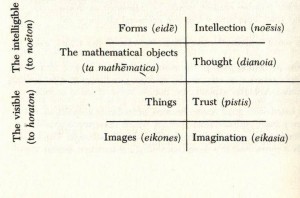Be it mine to look up to your light, even from afar, even from the depths. Teach me to seek you, and reveal yourself to me, when I seek you, for I cannot seek you, except you teach me, nor find you, except you reveal yourself. Let me seek you in longing, let me long for you in seeking; let me find you in love, and love you in finding. Lord, I acknowledge and I thank you that you has created me in this your image, in order that I may be mindful of you, may conceive of you, and love you; but that image has been so consumed and wasted away by vices, and obscured by the smoke of wrong-doing, that it cannot achieve that for which it was made, except you renew it, and create it anew. I do not endeavor, O Lord, to penetrate your sublimity, for in no wise do I compare my understanding with that; but I long to understand in some degree your truth, which my heart believes and loves. For I do not seek to understand that I may believe, but I believe in order to understand. For this also I believe, –that unless I believed, I should not understand. (From Anselm’s Proslogion)
Plato gave the intellect priority over faith but Anselm reverses this so that where Plato’s system leads the common man to put his faith in ‘philosophers’ who have seen ‘the light’ (Plato’s metaphor of the Cave), Anselm would have all men put their faith in God and see the light. Of course, Anselm is simply echoing the ultimate book of wisdom.
The fear of the LORD is the beginning of wisdom, and the knowledge of the Holy One is insight. (Prov. 9:10 ESV)

The two major competing political ideologies in the west can be traced back to Anselm and Plato. Modern progressives would have us place our faith in enlightenment figures who are experts in their fields whereas conservatives are suspicious of claims of ‘enlightenment’ and would seek to protect us from the evils of fallen humanity.